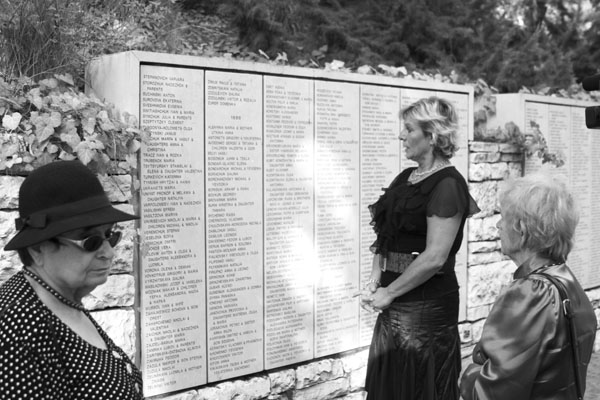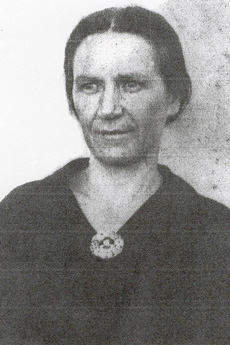
“She Paid the Ultimate Price”
The
New Pathway’s John Pidkowich interviewed Iryna Korpan,
host and reporter of OMNI TV’s Ukrainian program “Svitohliad”. She spoke about
family recollections of her maternal Grandmother Kateryna Sikorska and the
Holocaust. Ms. Korpan is producing a documentary film on this personal human
interest story.
John Pidkowich: What is your
family’s heroic yet tragic story?
Iryna Korpan: The
great tragedy of the Jewish people – the Holocaust – also appeared as a
terrible scar in our family, particularly on my Mother’s side. My Grandmother,
Kateryna Sikorska, at age 36 and a widow, hid three Jewish people in her home
under the kitchen floor during the Holocaust in Pidhaitsi,
JP: Please explain the
circumstances at the time and how did this happen?
IK:
Pidhaitsi is a small town in Halychyna (
Then, Klar saw danger not
only in the material confiscation of Jewish wealth, but also in blatant
life-threatening attacks [under the Nazis], witnessed openly in the streets.
Klar told my Grandmother that he had come across a southern Russian military
man, an artist who remained in the neighbouring
I n 1942, Jews were rounded
up into a ghetto. Half of them were transported to Belzec concentration camp
where they either died from exhaustion or were exterminated. Mikhail Klar
realized that certain death was at hand. He came again to my Grandmother, this
time asking her to hide him. They started digging at night under her kitchen
floor, at first to hide Klar alone, then to include the two Kressel brothers,
Dolyk and Leonid.
n 1942, Jews were rounded
up into a ghetto. Half of them were transported to Belzec concentration camp
where they either died from exhaustion or were exterminated. Mikhail Klar
realized that certain death was at hand. He came again to my Grandmother, this
time asking her to hide him. They started digging at night under her kitchen
floor, at first to hide Klar alone, then to include the two Kressel brothers,
Dolyk and Leonid.
JP: How did this woman, a
widow with three children, function under such severe circumstances?
IK:
Only through mercy, sympathy and good-heartedness. Truly, she wanted to save
these people, confined to this hiding spot for 9 months. Imagine sitting
crouched all day, afraid to come out during the day and coming out only at
night to stretch their legs. My grandmother’s children – Iryna, 13, being the
oldest, my Mother Khrystyna, 10, and the youngest being Maria, age 6 – were
instructed not to say anything to anyone about their great secret, even to
their closest schoolmates.
JP: When and how were the
Jews discovered, whom your Grandmother was hiding?
IK:
Wilhelm Herman, an officer of the Gestapo, was responsible for the
extermination of Jews in Berezhany district. Just before Easter in late March
1943, after nine months had elapsed, Herman came to the house. My Grandmother,
in preparation for the holidays, had just white-washed the house exterior and
was cleaning the paintbrush across the road. Herman and the police entered the
house asking where was the photographer Klar? Hearing this, my Mother quickly
ran outside and told her mother that the Germans were inside the house. Instead
of returning to their house, they ran to the Ukrainian priest’s house across
the road. Father Haidukevych let them in, and from there through a window they
observed what was happening.
It’s possible that what
brought the Germans to my Grandmother’s place was that someone with forged
Aryan papers had been apprehended and had turned in Mikhail Klar. They did not
know about the Kressel brothers.
The Germans began walking
around and started stomping on the floorboards, listening for a hollow sound
coming from the ground. Once this spot was located, imagine how these people
underground, with all their might, held down the floor trapdoor, to prevent it
from being opened. This went on for a while. Finally, Herman started beating my
Aunt Iryna severely across the face. A neighbour was ordered to come and with
heavy axe blows, broke through the trapdoor and pulled out the three Jews from
their hiding spot. Grandmother watched from the priest’s house how they were
taken away. She knew that she would not meet them any more …
JP: Now that the three Jews
in hiding were discovered, how did your grandmother try to save herself and her
children?
IK: My
Grandmother at that point did not want to return to her home, but went instead
to her sister’s in a neighbouring village and remained there until nightfall.
Then, grandmother turned to her children and explained that she would need to
return home to collect a few essential items in order to run away somewhere.
However, my Mother insisted on going with her and no sooner had they returned
and entered the house, the police and the Gestapo appeared. They took my
Grandmother to Pidhaitsi jail where she was kept for two days. Then she was
taken to Berezhany, where she was imprisoned for almost 9 months.
The next moment in the story
I find extremely emotional because when Easter came these children were
anticipating holiday joy and merriment. They undertook of their own accord to
bake a paska and to place eggs on the table. The three of them sat
around the table, at first in silence, and then started to cry with the
realization that their mother would never return. But they were determined to visit
their mother in prison. Whatever they could muster up – some salo, a
piece of bread – these children carried 30 km through rain and freezing
weather, to visit their mother and bring her a small care package, not knowing
whether the prison guard would even deliver it to her. They were never able to
see their mother close up, face-to-face, but only through bars from a distance
were they able to speak to her.
In 1943, after almost nine
months’ incarceration, their mother was taken to Ternopil where she was tried
and sentenced to death.
JP: Before the death
sentence was carried out, were any appeals for clemency made on behalf of your
grandmother?
IK:
Some have alleged that Ukrainians who saved Jews, did so for some monetary
gain. I want to say to everyone that there was nothing whatsoever for her to
gain! Rumour had it that Ukrainians were paid in gold; Jews paid money to
be kept in hiding. If this were so, my Grandmother could have bought her
release. The prosecutor told her that if she came up with 20,000 zloty, she
would be pardoned. Who had this kind of money?
JP: Please describe your
experience visiting
IK: The
son of photographer Mikhail Klar, Leonid Klar, who had initially been saved by
his Aryan identity papers, was eventually sent to Auschwitz but nonetheless was
able to save himself – it’s a miracle! I filmed him recently when we went to
When I went to Yad Vashem, I
looked at the wall honouring “the Righteous Ukrainians”, where my Grandmother
and Aunt Iryna (Sikorska) Gutor are named, having been given the honorific
title “Righteous Among the Nations”. I was also searching for various
other names and found that of Klement Sheptysky. Then I thought to myself, with
everything I have read about Metropolitan Andrey Sheptysky, why is he not also
listed here on the wall? The Jews themselves have written so much about him and
how he saved many of them. Why, their Rabbis were saved by him. I contacted one
Jew whom he saved, Kurt Lewin, a well-known political scientist living in
Iryna Korpan gives special
recognition to James Temerty who sponsored her travel to
1 - (L. to R.): Lida
Klar, Iryna Korpan and her mother Khrystyna Korpan in Yad Vashem near Wall of
Honor for the Righteous Among The Nations
2 - Kateryna Sikorska